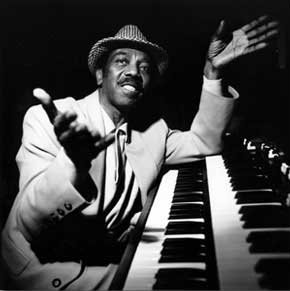| B i o g r a p h y |
 Jimmy Smith,
(December 8, 1925 (year of birth is disputable & is often stated as
1928) – February 8, 2005) was a jazz musician whose Hammond B-3
electric organ performances helped to popularize this instrument. Born
as James Oscar Smith in Norristown, Pennsylvania, U.S.. Smith was
influenced by both gospel and blues. He first achieved prominence in
the 1950s when his recordings became popular on jukeboxes. In the late
1950s and the sixties he helped to create the jazz style known as 'soul
jazz'. In 2005, Jimmy Smith was awarded the NEA Jazz Masters Award from
the National Endowment for the Arts, the highest honors that the United
States bestows upon jazz musicians.
Jimmy Smith,
(December 8, 1925 (year of birth is disputable & is often stated as
1928) – February 8, 2005) was a jazz musician whose Hammond B-3
electric organ performances helped to popularize this instrument. Born
as James Oscar Smith in Norristown, Pennsylvania, U.S.. Smith was
influenced by both gospel and blues. He first achieved prominence in
the 1950s when his recordings became popular on jukeboxes. In the late
1950s and the sixties he helped to create the jazz style known as 'soul
jazz'. In 2005, Jimmy Smith was awarded the NEA Jazz Masters Award from
the National Endowment for the Arts, the highest honors that the United
States bestows upon jazz musicians.
Smith was a prolific recording artist, recording with the Blue Note label beginning in 1956. His early albums with Blue Note, included Home Cookin' , The Sermon!, The Champ, House Party, Midnight Special, Prayer Meetin' , and Back at the Chicken Shack. Smith signed to Verve Records label in 1963. Smith's albums with Verve include The Cat, The Boss, Root Down, Peter & The Wolf, Any Number Can Win, Who's Afraid of Virginia Woolf?, The Incredible..., Bashin, Got My Mojo Workin, Christmas Cookin, and Organ Grinder Swing. While he was signed to Verve, he began collaborating with guitarist Wes Montgomery, with whom he recorded two albums: The Dynamic Duo with Wes Montgomery and Further Adventures Of Jimmy and Wes. Smith recorded with a full orchestra and worked with arrangers and conductors such as Lalo Schifrin, Claus Ogerman, and Oliver Nelson. He also worked in small groups such as organ trios that featured jazz musicians such as Kenny Burrell, Donald "Duck" Bailey, Grady Tate, Lee Morgan, Lou Donaldson, Tina Brooks, Jackie McLean and Stanley Turrentine. Smith had a career revival in the 1980s and 1990s, again recording for Blue Note and Verve, and for the Milestone label. Smith also recorded with other artists including: Love And Peace: A Tribute To Horace Silver with Dee Dee Bridgewater (1995) and Blue Bash! with Kenny Burrell (1963)
While the electric organ was used in jazz by Fats Waller and Count Basie, Smith's virtuoso improvisation technique on the Hammond helped to popularize the electric organ as a jazz and blues instrument. For ballads, he played walking bass lines on the bass foot pedals. For uptempo tunes, he would play the bass line on the lower manual and use the pedals for emphasis on the attack of certain notes, which helped to emulate the attack and sound of a string bass. His solos were characterised by percussive chords mixed with very fast melodic improvisation with the right hand. Smith used a drawbar registration in which the drawbars were pulled out so that the drawbar gradations would read-from the lowest to the highest harmonics-as "868000000" or "888000000" on the lower manual.[citation needed] Smith used the lower manual for the bass line and to perform accompaniment (also called "comping") chords. He used a similar registration on the upper manual, which he used for soloing, but with the addition of other harmonics during the attack of the note (using the Hammond's "percussion" circuit).
Smith influenced many other jazz organists. More recently, Smith influenced bands such as the Beastie Boys, who sampled the bassline from "Root Down (and Get It)" from Root Down—and saluted Smith in the lyrics—for their own hit "Root Down," Medeski, Martin & Wood, and The Hayden-Eckert Ensemble. The Acid Jazz movement also reflects Smith's organ style. In 1999, Smith guested on two tracks of a live album, Incredible!- with his protégé, Joey DeFrancesco, a then 28-year-old organist. Smith and DeFrancesco later played together on the collaborative album Legacy, released in 2005 shortly after Smith's death.